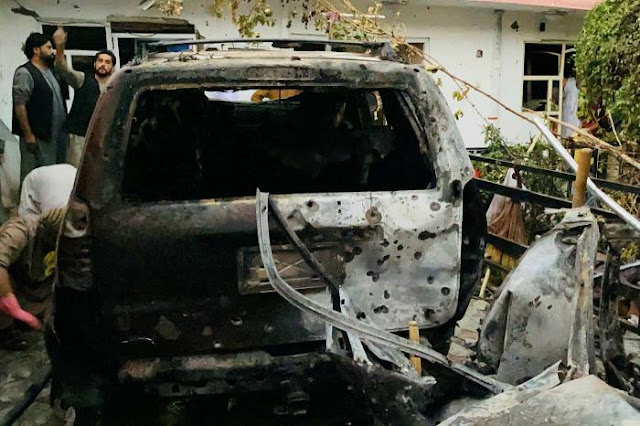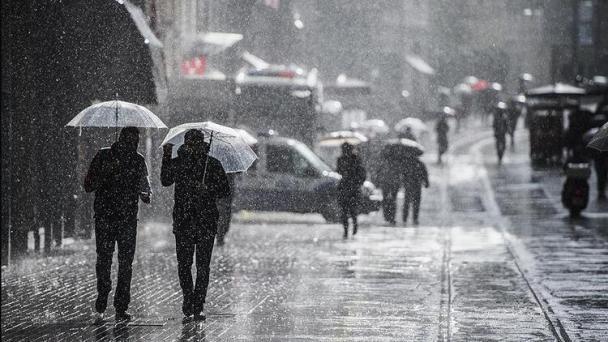US launches air strike in Kabul to thwart second attack on airport
US launches air
strike in Kabul to thwart second attack on airport
Drone rocket destroys vehicle days after
suicide attack killed more than 100 as evacuation enters final days
Please
use the sharing tools found via the share button at the top or side of
articles. Copying articles to share with others is a breach of FT.com T&Cs
and Copyright
Policy. Email licensing@ft.com to buy
additional rights. Subscribers may share up to 10 or 20 articles per month
using the gift article service. More information can be found here.
The US launched a drone strike to protect the Kabul evacuation effort on Sunday
as the Biden administration and its European allies promised to help
people leave Afghanistan after Tuesday’s deadline for withdrawal. The US
military said it had carried out a “self-defence” strike on a vehicle in the
Afghan capital that it said posed an “imminent Isis-K threat” to the airport.
Isis-K, the local branch of the Islamist terror group, claimed responsibility for
a suicide bombing on Thursday that killed more than 100 Afghans and 13 US
troops. “We are confident we successfully hit the target,” said Captain Bill
Urban, a US Central Command spokesperson. Urban later added that the US was
investigating reports of civilian casualties. “We know that there were
substantial and powerful subsequent explosions resulting from the destruction
of the vehicle, indicating a large amount of explosive material inside that may
have caused additional casualties. It is unclear what may have happened,” he
said. Footage showed a cloud of smoke above a neighbourhood in north-west
Kabul, though it was not immediately clear if it was the result of the same
attack. The drone strike came hours after Joe Biden warned that another terror
attack was “highly likely in the next 24-36 hours”.
Please
use the sharing tools found via the share button at the top or side of
articles. Copying articles to share with others is a breach of FT.com T&Cs
and Copyright
Policy. Email licensing@ft.com to buy
additional rights. Subscribers may share up to 10 or 20 articles per month
using the gift article service. More information can be found here.
Jake Sullivan, US national security adviser, told CNN: “We are doing everything
in our power to prevent and disrupt the threat streams that we are seeing and
stopping any kind of attack that would endanger the lives of American service
members or civilians trying to get into the airport.” “But all we can do is
mitigate risk, we cannot eliminate it and we are in a period of serious danger,
given what we are seeing in the intelligence.” The Taliban, which seized power
this month, has increased its military presence around Kabul airport since last
week’s attack, adding to concerns that its fighters were blocking large numbers
of Afghans eligible for evacuation from leaving. The US and 95 other countries,
as well as the EU and Nato, released a statement on Sunday that said the
Taliban had promised foreign nationals and Afghans with travel authorisation
would be permitted to leave. “We will continue issuing travel documentation to
designated Afghans, and we have the clear expectation of and commitment from
the Taliban that they can travel to our respective countries,” the statement
said. The Taliban has set up multiple checkpoints on the approach to the
airport to search and vet those fleeing against lists of would-be evacuees.
Some locations were manned by heavily armed fighters brandishing US-issued
weapons and tactical gear seized from the Afghan army. The US has evacuated or
helped airlift more than 114,000 people since August 14. But the Biden administration
hopes to evacuate hundreds more, including about 300 American civilians.
Please
use the sharing tools found via the share button at the top or side of
articles. Copying articles to share with others is a breach of FT.com T&Cs
and Copyright
Policy. Email licensing@ft.com to buy
additional rights. Subscribers may share up to 10 or 20 articles per month
using the gift article service. More information can be found here.
Many experts have warned that the administration would be unable to airlift all
Americans by the Tuesday deadline, but Sullivan said individuals would still be
able to leave afterwards with the help of the Taliban. “After August 31, we
believe we have substantial leverage to hold the Taliban to its commitments and
allow safe passage to American citizens, legal permanent residents and [our]
Afghan allies,” he said. Wang Yi, China’s foreign minister, told Antony
Blinken, US secretary of state, on Sunday that the two countries must
“positively guide” Afghanistan’s new Taliban government and help it stabilise
the country. Wang also urged the US to “alleviate rather than intensify conflicts”
in the war-torn nation, according to a Chinese foreign ministry statement.
Blinken urged Beijing to help “hold the Taliban accountable” for its earlier
commitments to facilitate free passage for those seeking to leave Afghanistan,
according to a US state department spokesperson. France and the UK will launch
a diplomatic push to create a safe zone in the Afghan capital for those still
attempting to leave the country, with a UN Security Council resolution due to
be tabled on Monday.
Please
use the sharing tools found via the share button at the top or side of
articles. Copying articles to share with others is a breach of FT.com T&Cs
and Copyright
Policy. Email licensing@ft.com to buy
additional rights. Subscribers may share up to 10 or 20 articles per month
using the gift article service. More information can be found here.
Kiran Stacey, Katrina Manson and James Politi in Washington AUGUST 30 2021
Print this page Afghanistan updates Sign up to myFT Daily Digest to be the
first to know about Afghanistan news. The US launched a drone strike to protect
the Kabul evacuation effort on Sunday as the Biden administration and its
European allies promised to help people leave Afghanistan after Tuesday’s
deadline for withdrawal. The US military said it had carried out a
“self-defence” strike on a vehicle in the Afghan capital that it said posed an
“imminent Isis-K threat” to the airport. Isis-K, the local branch of the
Islamist terror group, claimed responsibility for a suicide bombing on Thursday
that killed more than 100 Afghans and 13 US troops. “We are confident we
successfully hit the target,” said Captain Bill Urban, a US Central Command
spokesperson. Urban later added that the US was investigating reports of
civilian casualties. “We know that there were substantial and powerful
subsequent explosions resulting from the destruction of the vehicle, indicating
a large amount of explosive material inside that may have caused additional
casualties. It is unclear what may have happened,” he said. Footage showed a
cloud of smoke above a neighbourhood in north-west Kabul, though it was not
immediately clear if it was the result of the same attack. The drone strike
came hours after Joe Biden warned that another terror attack was “highly likely
in the next 24-36 hours”. The US said it had carried out a ‘self-defence’ drone
strike on a vehicle in Kabul because of an ‘imminent Isis-K threat’ near
Kabul’s airport on Sunday © Stringer/EPA-EFE/Shutterstock Jake Sullivan, US
national security adviser, told CNN: “We are doing everything in our power to
prevent and disrupt the threat streams that we are seeing and stopping any kind
of attack that would endanger the lives of American service members or
civilians trying to get into the airport.” “But all we can do is mitigate risk,
we cannot eliminate it and we are in a period of serious danger, given what we
are seeing in the intelligence.” The Taliban, which seized power this month,
has increased its military presence around Kabul airport since last week’s
attack, adding to concerns that its fighters were blocking large numbers of
Afghans eligible for evacuation from leaving. The US and 95 other countries, as
well as the EU and Nato, released a statement on Sunday that said the Taliban
had promised foreign nationals and Afghans with travel authorisation would be
permitted to leave. “We will continue issuing travel documentation to
designated Afghans, and we have the clear expectation of and commitment from
the Taliban that they can travel to our respective countries,” the statement
said. The Taliban has set up multiple checkpoints on the approach to the
airport to search and vet those fleeing against lists of would-be evacuees.
Some locations were manned by heavily armed fighters brandishing US-issued
weapons and tactical gear seized from the Afghan army. The US has evacuated or
helped airlift more than 114,000 people since August 14. But the Biden
administration hopes to evacuate hundreds more, including about 300 American
civilians. Joe Biden travelled to Dover Air Force Base to formally receive the
bodies of 13 members of the US military who were killed in a suicide bomb
attack in Kabul last week © US Marines handout/Reuters Many experts have warned
that the administration would be unable to airlift all Americans by the Tuesday
deadline, but Sullivan said individuals would still be able to leave afterwards
with the help of the Taliban. “After August 31, we believe we have substantial
leverage to hold the Taliban to its commitments and allow safe passage to
American citizens, legal permanent residents and [our] Afghan allies,” he said.
Wang Yi, China’s foreign minister, told Antony Blinken, US secretary of state,
on Sunday that the two countries must “positively guide” Afghanistan’s new
Taliban government and help it stabilise the country. Wang also urged the US to
“alleviate rather than intensify conflicts” in the war-torn nation, according
to a Chinese foreign ministry statement. Blinken urged Beijing to help “hold
the Taliban accountable” for its earlier commitments to facilitate free passage
for those seeking to leave Afghanistan, according to a US state department spokesperson.
France and the UK will launch a diplomatic push to create a safe zone in the
Afghan capital for those still attempting to leave the country, with a UN
Security Council resolution due to be tabled on Monday. The UK wrapped up its
evacuation efforts over the weekend, with the last group of troops and embassy
staff landing at RAF Brize Norton on Sunday. © Samantha Holden/Ministry of
Defence/AFP/Getty France has received backing for the plan from Germany, but
Paris was waiting for a response from Russia and China, also members of the UN
SC, according to people familiar with the situation. “Our draft resolution aims
to establish, under UN control, a safe zone in Kabul which would allow the
continuation of humanitarian operations,” France’s president Emmanuel Macron
told newspaper Le Journal du Dimanche. “It would give a framework for the UN to
take urgent action, and above all, it would let us confront everyone with their
responsibilities and allow the international community to maintain pressure on
the Taliban,” he added.
Please
use the sharing tools found via the share button at the top or side of
articles. Copying articles to share with others is a breach of FT.com T&Cs
and Copyright
Policy. Email licensing@ft.com to buy
additional rights. Subscribers may share up to 10 or 20 articles per month
using the gift article service. More information can be found here.
Germany has not officially announced its support for the initiative but Heiko
Maas, foreign minister, left for the region on Sunday to discuss continuing
evacuations. “Germany’s commitment does not end with the completion of the
military evacuation mission,” Mass said, vowing to “work to ensure that
international co-operation continues”. Such efforts, he said, involved
co-ordinating with neighbouring states on further evacuations. Biden travelled
to Dover Air Force Base in Delaware on Sunday to formally receive the bodies of
the 13 US troops who were among those killed by the blast last week. The
president also met some of the families of the service members. Additional
reporting by Fazelminallah Qazizai in Kabul, Leila Abboud in Paris and Erika
Solomon in Berlin and Tom Mitchell in Singapore
FINANCIEL
TIMES




Yorumlar
Yorum Gönder